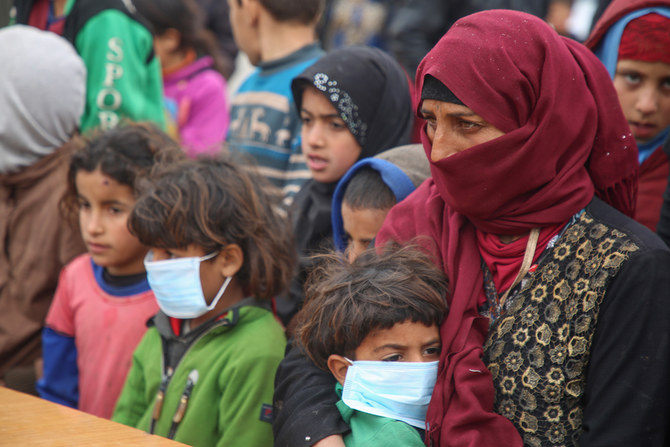ABU DHABI: Every minute, nearly 30 people worldwide leave everything behind to escape war, persecution or terror.
As a result, one in every 97 people on the planet — more than 1 percent of humanity — is forcibly displaced.
These are just two of the many grim statistics cited by the latest edition of the Global Trends Report, which is being released by the UN Refugee Agency (UNHCR) to mark World Refugee Day on June 20.
The UNHCR, which has termed the current global refugee crisis as the highest level of human displacement on record, is appealing to nations, governments and individuals to do more to help displaced people find homes and a stable future.
The Global Trends Report says that “an unprecedented 79.5 million were displaced as of the end of 2019,” and that the “UNHCR has not seen a higher total.”
More than half of the displaced population — 45.7 million people — fled to other areas in their own country, thus becoming internally displaced persons (IDPs).
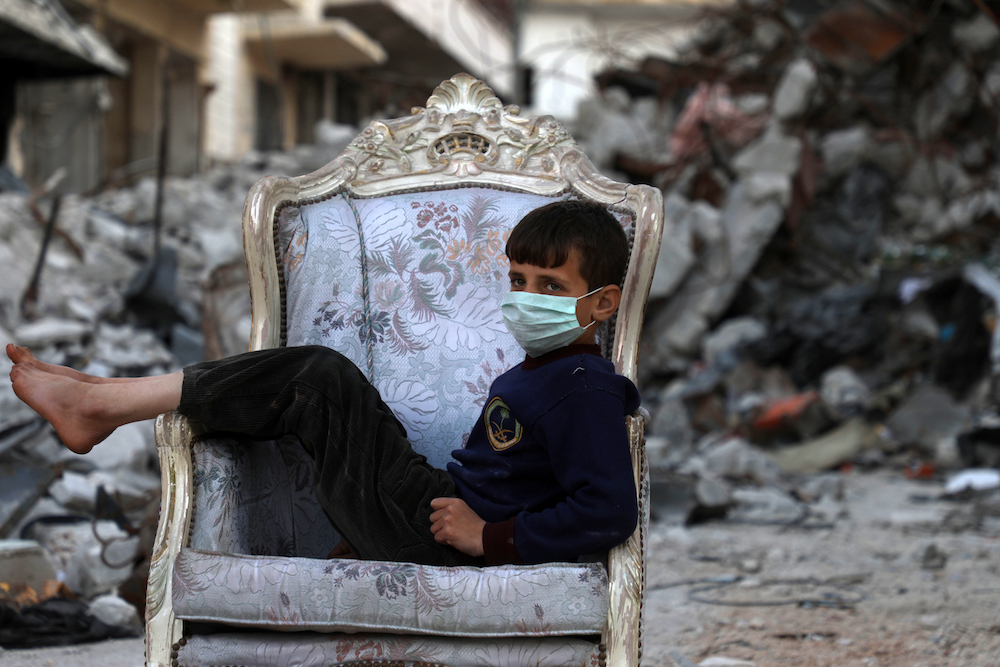
A child sits on a couch found in a street, ravaged by pro-regime forces air strikes, in the town of Ariha in the southern countryside of the Idlib province on April 11, 2020. (AFP/File Photo)
Another 4.2 million awaited the outcome of asylum requests. The number of “refugees and others” forcibly displaced from their home countries stood at 29.6 million.
Among the displaced are an estimated 30-34 million children, tens of thousands of them unaccompanied, according to the Global Trends Report.
Two-thirds of people displaced across borders originated from just five countries: Syria, Venezuela, Afghanistan, South Sudan and Myanmar.
From South America to South Asia, the effects of conflict continue to be felt most by neighboring countries.
Three countries hosted displaced people almost exclusively from one country: Turkey (3.6 million Syrians), Colombia (1.8 million Venezuelans) and Pakistan (1.4 million Afghans).
The UNHCR says two factors mainly accounted for the increase in global refugee numbers from 70.8 million at the end of 2018 to 79.5 million at the end of 2019.
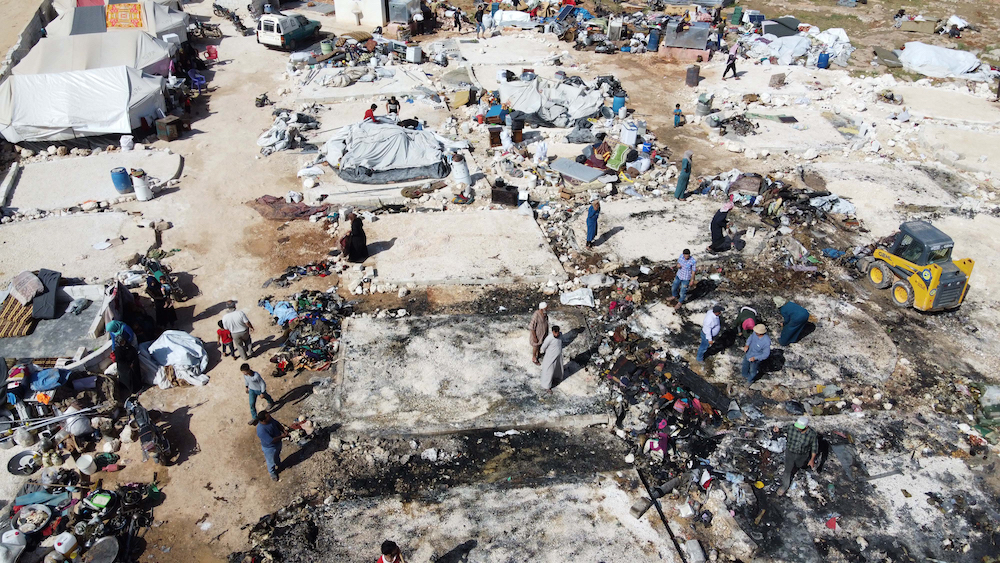
An aerial view shows charred tents, after a fire that was reportedly caused by a cooking accident destroyed dozens of temporary shelters housing displaced Syrians, in the Deir Hassan camp for the displaced, in Syria's northwestern Idlib province's northern countryside near the Turkish border, on May 17, 2020. (AFP/File Photo)
The first was continued unrest in two areas in Africa — the Democratic Republic of Congo (DRC) and the Sahel — and in two countries in the Middle East — Yemen and Syria.
Syria, which is in its 10th year of conflict, has created 13.2 million refugees, asylum-seekers and IDPs, who together account for a sixth of the current global population of displaced peoples.
The second factor behind the rise in the refugee numbers, according to the UNHCR, is a better understanding of the situation of Venezuelans currently outside their country.
In recent years, deteriorating political, socioeconomic and human rights conditions in Venezuela have resulted in the displacement of 3.6 million people.
Though not legally registered as refugees or asylum-seekers, many of them require protection-sensitive arrangements.
This means the host country is obliged to avoid applying legitimate control measures in an arbitrary manner when dealing with the cases of asylum-seekers and other categories. Rather, it is encouraged to address and understand the special protection needs of the displaced Venezuelans.
The increase in the numbers of displaced people worldwide is not the only challenge for the UNHCR. The inability of these people to return to their home country is also a growing cause for concern.
FASTFACTS
World Refugee Day
* World Refugee Day aims to raise awareness of refugee crisis.
* UNHCR says 79.5m people displaced worldwide as of end-2019.
* Children make up 30-34m of displaced population.
In the 1990s, about 1.5 million refugees were able to go back from their host country each year, says the Global Trends Report.
Over the past decade, however, that number has fallen to around 385,000, which means that the problem is in need of new solutions.
“We are witnessing a changed reality in that forced displacement nowadays is not only vastly more widespread, it is simply no longer a short-term and temporary phenomenon,” said Filipo Grandi, the UN high commissioner for refugees.
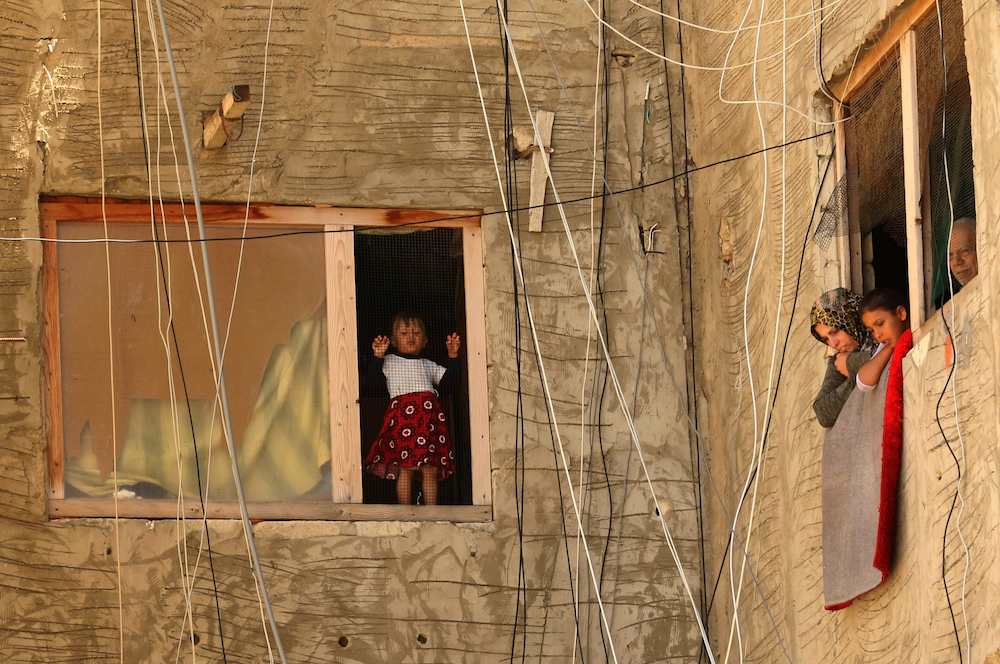
Syrian refugees watch from their window as others get tested for the covid-19, during a testing campaign organised by Lebanon's health ministry and the United Nations High Commissioner for Refugees (UNHCR) in the southern city of Sidon, on May 28, 2020. (AFP/File Photo)
The increase in the number of displaced shows the “human impact of decades of crises, wars, social breakdown, violence and persecution, aggravated by the climate emergency, inequality and exclusion.
“People cannot be expected to live in a state of upheaval for years on end, without a chance of going home, nor a hope of building a future where they are.
This year’s World Refugee Day is being marked against the backdrop of another unprecedented crisis: COVID-19, the largest health care emergency in modern history.
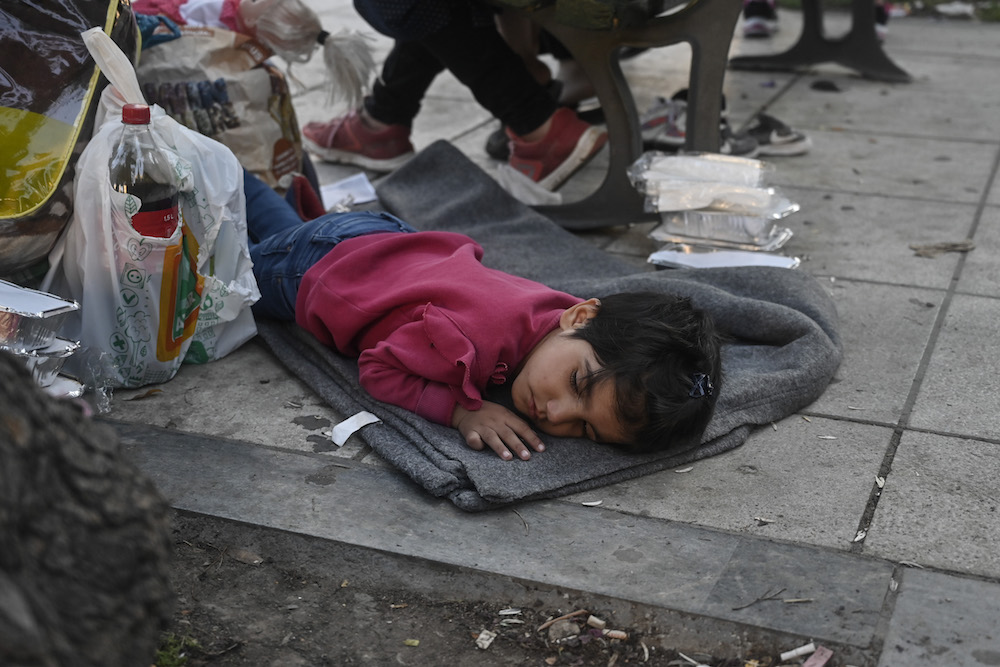
A child rests by her family's belongings as Afghan families who arrived from Moria camp on the island of Lesbos, camp at a central Athens square on June 14, 2020 after receiving a blue stamp which allowed them to travel to the mainland. (AFP)
As a result of the pandemic, which has affected 7.8 million people in more than 213 countries, the world’s attention and resources have been diverted away from issues such as the refugee crisis. For the displaced, the consequences have been dire.
Many refugees have lost their livelihood as a result of the restrictions on physical movement that host countries have imposed in an effort to halt the spread of coronavirus infections.
Their access to health care and education has also been affected in countries where the host communities have been hit hard by COVID-19 outbreaks.
This in addition to food shortages, poor living conditions and exposure to the infection in densely populated refugee camps.
The economic and psychosocial repercussions of the coronavirus crisis are of particular concern to the UNHCR, which believes that loss of daily wages will result in hardship for millions of refugees.
Even before the pandemic hit, the fact that 84 percent of the world’s refugees resided in developing regions meant they had limited access to mental health care.

A child sits on the doorstep of his home al-Shati refugee camp in Gaza City, as Palestinians mark the 72nd anniversary of the Nakba on May 14, 2020. - Palestinians are marking the 1948 Nakba, or "catastrophe", which left hundreds of thousands of Palestinians displaced by the war accompanying the birth of Israel. (AFP/File Photo)
“COVID-19 is not just a physical health crisis, it is now also triggering a mental health crisis,” said Grandi.
“While many refugees and internally displaced people are remarkably resilient and are able to move forward despite having experienced violence or persecution first-hand, their capacities to cope are now being stretched to the limit.”
In this environment of multiple crises competing for every host country’s limited pool of resources and generosity, the importance of understanding the message of World Refugee Day cannot be overstated.
EXPRESSIONS OF SOLIDARITY
• On World Refugee Day, the UNHCR is launching its first online collection of home decor products and accessories hand-crafted by refugees.
• Across the Middle East, June 20 is being observed with expressions of solidarity for the displaced, homeless and stateless.
• Saudi Arabia’s Kingdom Tower will be lit up in the color of UN blue, as will Kuwait’s Al-Hamra Tower.
• Egypt is commemorating World Refugee Day with Yadawee, a social enterprise that promotes Egyptian handicrafts. The virtual workshop encourages refugee artisans to talk about their experiences and teach participants how to make their own face masks.
• The UAE’s New York University Abu Dhabi Arts Center, in partnership with the UNHCR, is organizing a virtual play — “Revisit CARTOGRAPHY” — lives seen through the lens of four refugees. The play combines storytelling with interactive video technology, followed by a question-and-answer session.


